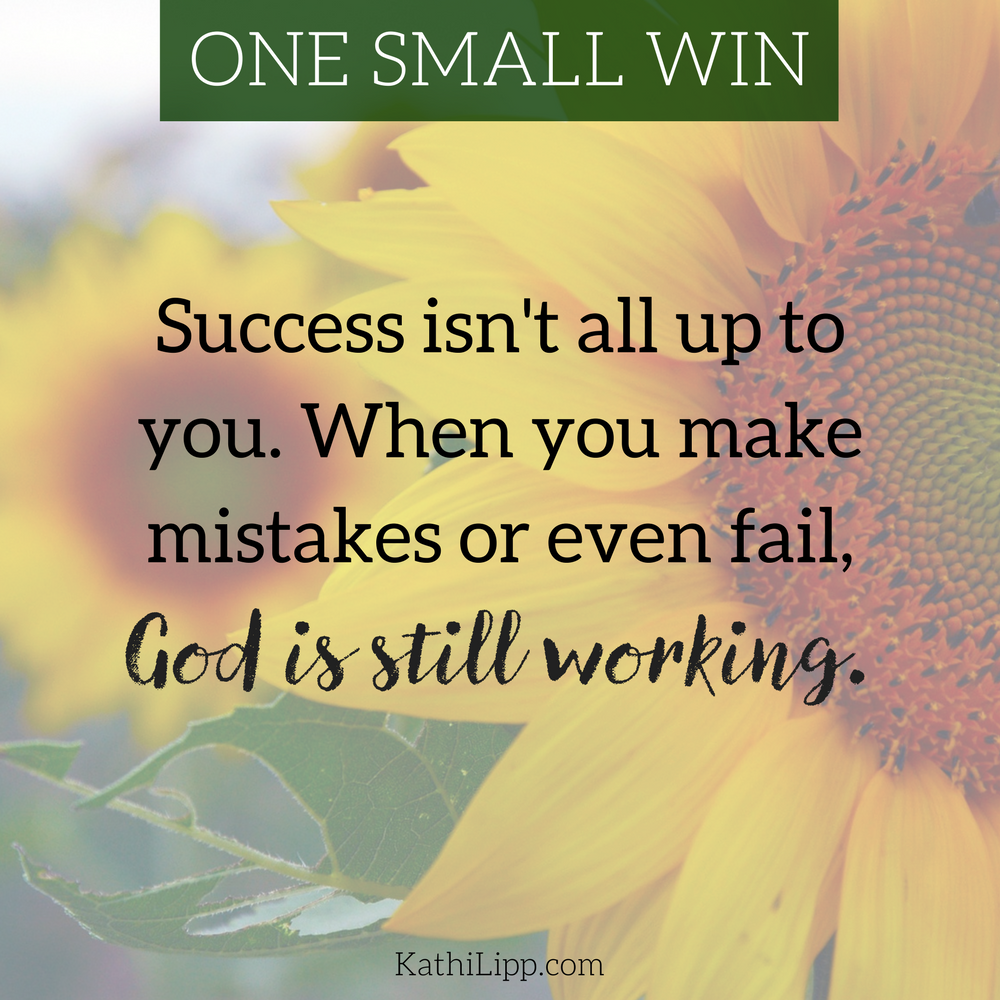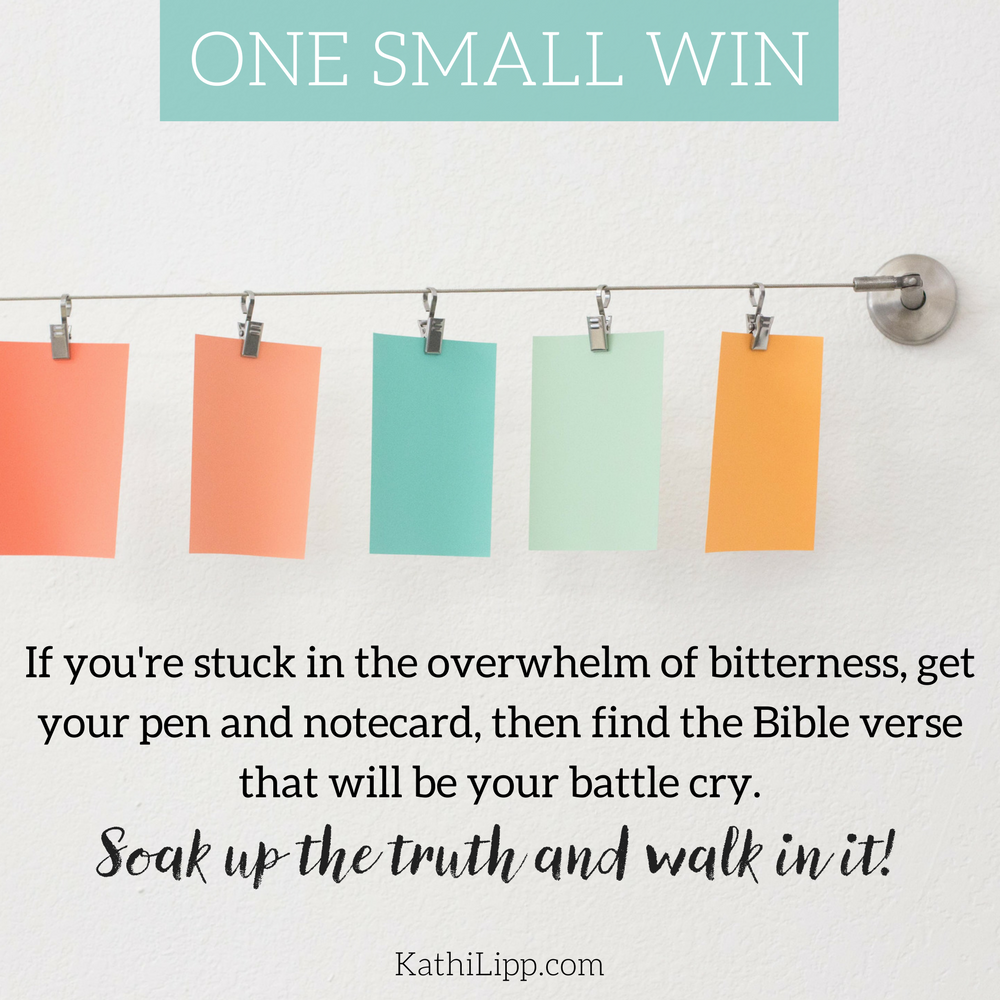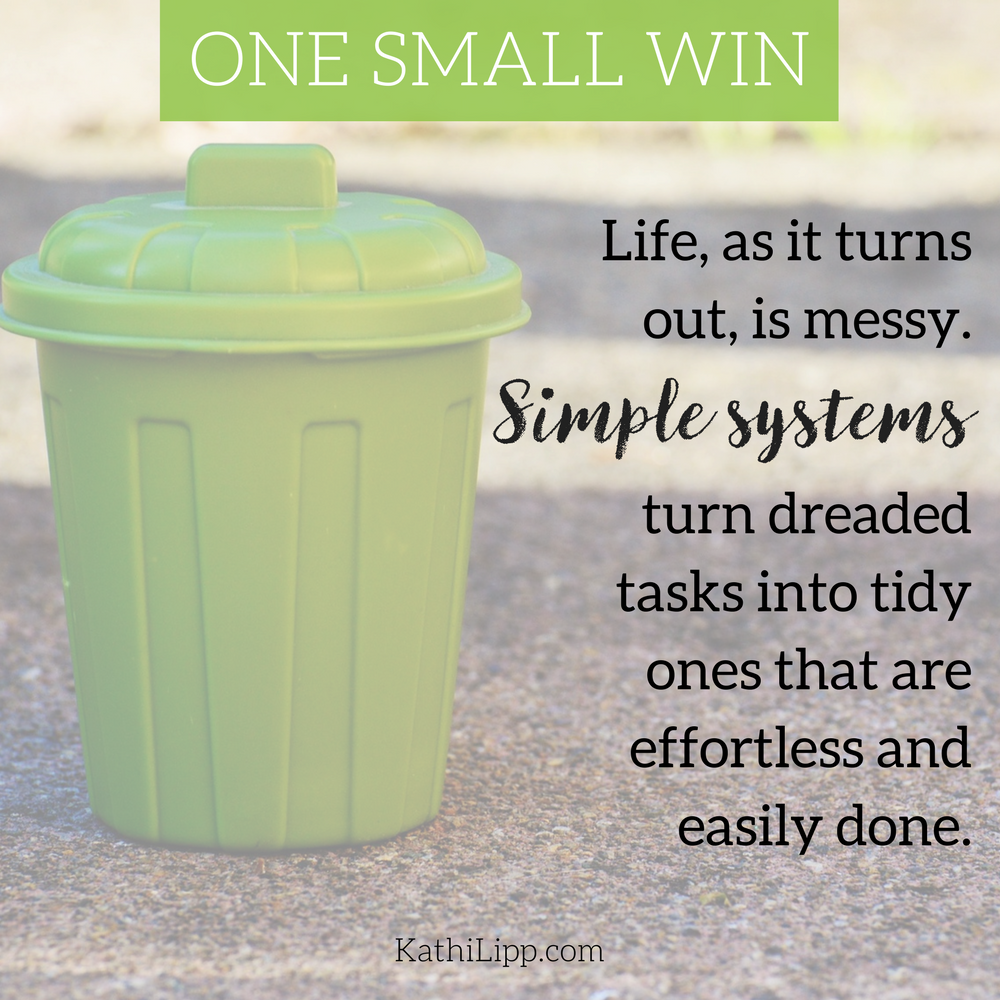
by Guest Blogger | Jan 30, 2017 | Guest Blog, Home, I Need Some Help Here |

I feel like I’m running in circles and accomplishing nothing!
As a newlywed, 23-year-old first year grad student, I found myself constantly repeating this refrain.
I was working a part-time job, getting my toes wet in ministry at my new church, and sharing a vehicle with my husband who just started his first full-time job.
Add household chores and trying to make new friends to the list, and I was one busy lady.
Do you know the feeling?
Always doing and going and then you close your eyes at the end of the day and think, “Surely I accomplished something…” Then as you lay there you discover your primary accomplishment was making it out alive!
I certainly felt that way. And I still do sometimes.
The acknowledgement jar
Which is why I created an Acknowledgement Jar.
It’s a repurposed vase, which I sat on my desk next to a stack of notecards and a pen.
At the end of each day, I challenge myself to think of at least two accomplishments for that day and write each one on a notecard, fold the cards into squares, and drop them in the jar.
These can be small victories, like completing my daily workout or avoiding late fees at the library.
Other times I write down bigger accomplishments, like landing an internship or earning a bonus.
Some days my only accomplishment is just making it through the day. And you know what? That’s okay!
The longer I’ve done this, the more accomplishments I am able to think of. I even have moments now where I’ll think to myself, I can’t wait to add this one to my jar!
Pull out your own vase
Maybe you’re learning to be an adult like me (hello bills!).
Perhaps you work over 40 hours a week and come home to children, hungry for your food and attention.
Or maybe you are a stay-at-home mom, making sure your home stays a haven.
Regardless of your routine or stage in life, I am confident that acknowledging your daily accomplishments will be encouraging!
This one simple habit has given me an eye for noticing all the little victories. I am thankful as I linger in these feel-good moments.
One Small Win: Create an Acknowledgement Jar today and be motivated by your own every day accomplishments!

What you need:
____Container (I used a vase I found under my sink, but a box, mason jar or basket works)
____Notecards
____Writing utensil
 Kelsee Keitel is a graduate student and blogger, living in Indianapolis, IN, with her newlywed husband. She is passionate about cultivating sisterhood through vulnerability and introducing young women to the freedom and abundance of life in following Christ. When Kelsee is not snuggled up with a book and sipping tea, she can be found experimenting in the kitchen or chatting with her mom.
Kelsee Keitel is a graduate student and blogger, living in Indianapolis, IN, with her newlywed husband. She is passionate about cultivating sisterhood through vulnerability and introducing young women to the freedom and abundance of life in following Christ. When Kelsee is not snuggled up with a book and sipping tea, she can be found experimenting in the kitchen or chatting with her mom.
You can read more about how Kelsee experiences divine moments in the midst of ordinary life over at kelseekeitel.com or on Instagram and Facebook.

by Guest Blogger | Jan 29, 2017 | Guest Blog, tips and ideas |

Do you ever get frustrated with people who suggest a “quick fix” solution for losing weight?
• “If you want to lose weight, you have to stop eating sugar.”
• “I lost weight using products that will change your life. Buy my products now.”
• “All you need is more willpower.”
I hate it when this happens. As someone who has lost and gained large amounts of weight many times, I know from experience that losing weight isn’t a one-size-fits-all challenge.
Unsolicited advice, regardless of how well-intended it may be, usually comes across as criticism.
How do you feel when someone tries to “fix” you with uninvited input? If it’s not weight loss, maybe it’s telling you how to:
• Feed your children.
• Spend your money.
• Resolve relational challenges.
How do you respond when someone tries to fix you?
I used to have one of two extreme responses, depending on who was talking to me. Do either of these sound familiar?
• Do nothing and act like it’s not bothering you, even though it does, and then later (maybe many weeks later) you blow up.
• React defensively and aggressively in the moment. Then later you wish you hadn’t.
Learning to become honest with the right people at the right time has been empowering. It’s helped me to not hear food calling my name when I start feeling irritated.
Here are several response options to someone trying to fix you with their advice. Experiment to find what works best for you.
Respond in the moment
If you are talking with someone who tends to react in a positive manner when challenged, choose a simple response.
For example, “Thanks for caring. I’ve got that area of my life covered.”
Respond Later
If you are talking to someone who has a history of not listening to you and even becoming defensive, it’s helpful to have a conversation later.
Be sure to initiate the conversation another time; don’t let it go.
Respond Selectively
For some situations, I choose my battles, viewing it as their issue and not mine.
For example, with someone I will probably not see again, I often decide to let it go.
If it’s still bothering me, I either journal or talk to someone else about how I am feeling.
Choose Your Response
So, the next time someone offers unsolicited advice meant to fix you, remember: you can learn to choose your response.
These questions will help:
• Is there a history of the person responding positively when challenged? If so, respond honestly in the moment.
• Is there a history of the person responding defensively or aggressively in the moment when challenged? If so, choose a better time to have a conversation about the impact of their advice.
• Is this a relationship with no future? If so, journal or talk about it later with someone else.
One Small Win: Be intentional about practicing these responses. You’ll be glad that you did.

What’s your typical response when someone offers you unsolicited advice?

Mary Lou Caskey trains Christian coaches and communicators to influence hearts through the power of story. If you want to become a transformative storyteller, click here to connect with Mary Lou and get her free quiz, “Is It the Best Time to Share a Personal Story?”

by Guest Blogger | Jan 28, 2017 | Clutter Free, Overwhelmed |

When my son, Jonathon, was seven, he was totally into Monopoly.
I went on eBay and found a Monopoly clock, Monopoly mug, and then struck the Monopoly motherlode: Monopoly fabric!
Started
I bought enough to make a quilt, pillows, and curtains.
I signed up for a quilt-making class, where I cut a lot of the fabric into a lot of strips. I even sewed some of the strips into T shapes.
Then–-as is so typical for my Expressive personality–-I ran out of steam.
Stopped
I quickly became overwhelmed by all the attention to detail that making a “T Quilt” requires.
I didn’t want details; I wanted a quilt!
So, I set the project aside. Then bagged it up. Eventually, stored it in the garage.
For. Ten. Years.
Stored
A decade later, when I pulled out the box that held the bag holding all the Monopoly fabric, my heart took a fantastical leap.
“I can finish this now … or this summer … or next year!” I started thinking.
But thanks to Clutter Free, I knew that my habit of storing stuff was not good stewardship.
Letting of an unfinished project
So I took photos of the Monopoly fabric and posted them on Facebook with the note, “Free to good home.”
Sherry, an acquaintance, responded immediately. An avid quilter, she offered to take, and promised to use, all my quilting fabric and supplies.
Then–-as is so typical for my Expressive personality–-I forgot all about the fabric. Out of sight, out of mind. I’m an idea gal, a starter, so I moved on to new projects.
Two years later, Sherry blessed me with photos of the quilt that I started and she so lovingly finished:

It looks better than I ever imagined!
She gave the quilt to a family member who was thrilled to receive it and adores using it.
What started-stopped-and-stored project can you give away today?
One Small Win: You don’t have to hang on to the quilt…or the guilt. You don’t need to finish what you started. You can let someone else take it from here.


Cheri Gregory is a teacher, speaker, author, and Certified Personality Trainer. Her passion is helping women break free from destructive expectations. She writes and speaks from the conviction that “how to” works best in partnership with “heart, too.”
Cheri is the co-author, with Kathi Lipp, of The Cure for the “Perfect” Life and Overwhelmed.
Cheri has been “wife of my youth” to Daniel, her opposite personality, for twenty-eight years and is “Mom” to Annemarie (25) and Jonathon (24), also opposite personalities.
Are you a Highly Sensitive Person? Take the self-quiz and discover the surprising strengths of a tender heart.


by Guest Blogger | Jan 26, 2017 | Guest Blog, Relationships |

My husband and I were married nine years before we had a successful pregnancy. Before that, we suffered infertility, miscarriages, embarrassing questions, physical exams, and lots of heartache.
We spent a great deal of time in prayer beseeching God to grant us children and endured lots of “suggestions” (also embarrassing) from well-meaning people in our church.
I attended WAY too many baby showers, smiling my way through each of them while dying on the inside. I was so excited for the mother-to-be, but I was truly sad for me. I read every book I could get my hands on, and we tried various medical (both traditional and non-traditional) methods. My faith was strong enough to move mountains at the beginning of each cycle, but would be reduced to rubble when my period started.
While all this was happening, my husband and I were on staff at wonderful churches. They were filled with amazing people who we had the pleasure of serving and doing life alongside. We knew how to minister to people (or so we thought), but no Bible college degree prepared us for the heartache and emptiness that infertility and loss creates.
Statistics around infertility
According to the National Survey of Family Growth, my husband and I were not alone:
– Number of women aged 15-44 with impaired fecundity (impaired ability to get pregnant or carry a baby to term) number 7.5 million.
– Percentage of women aged 15-44 with impaired fecundity is 12.3%.
– Number of married women aged 15-44 that are infertile (unable to get pregnant after at least 12 consecutive months of unprotected sex with husband) number 1.0 million.
– Percentage of married women aged 15-44 that are infertile is 6.1%.
That being said, although we were able to finally have two healthy children, one of the most fruitful lessons from that time in our lives was on HOW best to love on those who are going through a similar desert experience.
Ways to encourage a couple experiencing infertility
God proved Himself faithful and we came out the other side wiser and with some helpful tools for helping others cope. For those of you with someone in your life who is experiencing infertility, some ways to encourage them include:
1. Pray. Pray for those in your life who are struggling with infertility. Infertility involves all parts of the couple: their spiritual, physical, mental, and emotional lives. They need prayer support.
2. Be a friend. Just be their friend. Come alongside them. Ask how you can help; not everyone grieves and processes the same. Don’t be surprised if they need help with a meal or around the house. Don’t pity them, just love them. I just wanted someone to hold my hand and encourage my husband. I loved random cards and phone calls.
3. Think before posting or speaking. Avoid “meme-ing” them. Do not feel that trite Christian encouragement is the answer. Do not send well-meaning Facebook or Instagram memes without spending quality time with them. In fact, as someone who loves the Bible, I found that sometimes the most hurtful things people said were Scriptures not aptly timed. Romans 8:28 is an incredible wealth of truth, but right after a miscarriage, it felt like a dagger in my heart.
You are there for a reason
Infertility is a tough time in the life of a couple. It can often feel like a time of emotional and spiritual infertility as well. If you have someone in your life who is going through this, please know that God has placed you in their lives for a reason.

One Small Win: Love them and know that they will be forever thankful for your generosity of prayer, time, and encouragement.
Amberly Neese is a national speaker, author, and humorist with a passion for pointing others to the joy found in Christ. She has won hearts (and funny bones) of people all over the country at hundreds of conventions, camps, seminars, retreats, and chapels. She also serves as the program director at UCYC and an adjunct professor at Grand Canyon University. Amberly received her Master’s degree from Biola University.
is a national speaker, author, and humorist with a passion for pointing others to the joy found in Christ. She has won hearts (and funny bones) of people all over the country at hundreds of conventions, camps, seminars, retreats, and chapels. She also serves as the program director at UCYC and an adjunct professor at Grand Canyon University. Amberly received her Master’s degree from Biola University.
Amberly has been married to Scott Neese since 1992. They have two kids, Judah and Josiah. They live in beautiful Prescott, AZ and love the Food Network and all things Star Wars. You can follow her on Twitter and Instagram.

by Guest Blogger | Jan 24, 2017 | Blog, God, Guest Blog |

We all struggle with identity—who we are, why we are, and what we have to offer. About the time we start to feel good about ourselves, something happens to leave us fully aware of what we lack. A harsh word. A wounded relationship. A mistake, misstep or failure. Then, in spite of our best efforts to get over it and move on, we end up ‘hoarding’ people and stuff at an effort to make ourselves feel more secure.

When it comes to this epidemic of misplaced identity, few people have earned the right to be heard like my friend Michele Cushatt. Michele knows what it’s like to lose her footing and wonder who she is. But she also know what it’s like to push through the darkness, to cry out to God for mercy, and to discover the miracle of a God who delivers exactly what she needs most of all.
I’m a hoarder. Not in the sense of the reality television show, thank heavens. I can’t watch that horror for even five minutes without developing hives.
No, you will not find piles of junk or garbage or trinkets clogging my house from floor to ceiling. I’m quite the opposite. A neat freak to the core. I like it that way.
But when it comes to food, I tend to stockpile. Perhaps it’s because I’m a foodie at heart. Or maybe it has something to do with the fact that I am the primary chef for a large and chronically hungry family. That means planning and preparing meals takes up a large chunk of each day. Not to mention multiple two-shopping-cart trips to the grocery store.
Helloooooooo, second mortgage.
Or maybe my food hoarding has nothing to do with those things at all. Perhaps, at root, it’s more about fear.
When it comes to food, I like the safety of stocking up. Not that I eat it; I simply need it nearby. Just in case. This urge to guard against hunger only increased after multiple surgeries that compromised my ability to eat normally. I’m afraid of starving without the resources to be fed. Feeding tubes and no food by mouth for months at a time will do that to a girl.
My chronic hunger goes beyond food, however. There’s a soul hunger I find myself equally compulsive to satisfy.
A hunger for approval from those I love.
A longing for meaningful relationships.
A need to know I’m doing a good job and pleasing those I most respect.
A desire for my life to count and to capture the attention of the Creator.
Although the cure for this hunger may not be as obvious as grocery store runs and cooking marathons, the fallout can be far more dangerous.
John 4 tells of a woman who understood starvation of the soul. A Samaritan with a sordid history, she met the Savior one day while drawing water from the community well. What began as a daily chore turned into a life-changing encounter.
“Will you give me a drink?” This was the first thing Jesus said to the woman (John 4:7).
She hesitated, confused by His crossing of gender and racial barriers by speaking to her. He was a Jew, she a Samaritan. Two cultures that mixed as well as oil and water. And yet He had spoken to her, had asked her for a drink. She questioned why:
“You are a Jew and I am a Samaritan woman. How can you ask me for a drink?” (v. 9).
He responded in riddle, encouraging her to think beyond the physical well and physical water:
“If you knew the gift of God and who it is that asks you for a drink, you would have asked him and he would have given you living water . . . Everyone who drinks this water will be thirsty again, but whoever drinks the water I give them will never thirst. Indeed, the water I give them will become in them a spring of water welling up to eternal life” (John 4:10, 13–14).
His riddle must have perplexed her as it perplexes me. Living water? Water that never needs to be replenished? Thirst that never comes back? That’s quite a promise.
And yet promise it He did. According to John, the woman had five husbands and was living with a man she wasn’t married to. We don’t know much about her story, but it’s safe to assume she’d been “hoarding” relationships because her heart was desperate to be fed.
I don’t have a history of five husbands, but I know what it’s like to find my filling in lesser places. In my hunger of heart and soul, I’ve been known to compromise what is right and good to find a scrap of attention I desperately needed. The problem is the things I thought would satisfy made me even thirstier than before.
Have you ever been there? Do you know the desperation that can lead you to find satisfaction in a temporary well? And it’s not always other people that pull us from the living water. At times it’s money. Or food. Or success. Or awards. Or the next promotion. Or the drive to be perfect.
We’ve become experts at quenching our thirst with lesser loves. But like addicts who always need a bigger hit, we find nothing ever satisfies.
We need a different kind of well with a different kind of water.
And, thank the Lord in heaven, we have one.
He offers to quench our every thirst and feed our hungry souls, day after day. He is not turned off by our need, nor annoyed by our regular walks to the well of His presence. He knows before we do exactly what our souls crave.
And He promises to dish out a feast that can’t possibly compare to any other fare.

 Pulling from her experiences of raising children from trauma, a personal life-threatening illness, and the devastating identity crises that came to her family as a result, Michele creates safe spaces for honest conversations around the tensions between real faith and real life.
Pulling from her experiences of raising children from trauma, a personal life-threatening illness, and the devastating identity crises that came to her family as a result, Michele creates safe spaces for honest conversations around the tensions between real faith and real life.
The words of Michele’s most recent book—I Am: A 60-day Journey to Knowing Who You Are Because of Who He Is—were penned during her long and grueling recovery from a third diagnosis of cancer during which she was permanently altered physically, emotionally and spiritually. In it, she speaks with raw honesty and hard-earned insight about our current identity epidemic and the reasons why our best self-help and self-esteem tools aren’t enough to heal our deepest wounds.
Michele and the love of her life, Troy, live in the mountains of Colorado with their six children, ages 9 to 24. She enjoys a good novel, a long run, and a kitchen table filled with people. Learn more about Michele at michelecushatt.com.
Description of I Am
From the moment a woman wakes until she falls, exhausted, on her pillow, one question plagues her at every turn:
Am I enough?
The pressure to do more, be more has never been more intense. Online marketing. Self-help books. Movies, magazines and gym memberships. Even church attendance and social media streams have become a means of comparing ourselves to impossible standards. Am I pretty enough? Hip enough? Spiritual enough?
We fear the answer is “No.”
When a brutal bout with cancer changed how she looked, talked, and lived, Michele Cushatt embarked on a soul-deep journey to rediscover herself. The typical self-esteem strategies and positivity plans weren’t enough. Instead, she needed a new foundation, one that wouldn’t prove flimsy when faced with the onslaught of day-to-day life.
With raw personal stories, rock-solid biblical teaching, and radical truths on which to rebuild your life, I Am will help you:
- End the barrage of negative self-talk with an empowering new narrative.
- Refuse to ride the rollercoaster of others’ opinions and start believing what God’s says about you.
- Stop agonizing over past regrets and failures and make peace with God’s sovereign plan for your life.
- Leave insecurity behind as you exchange temporary fixes for an identity established on God’s unchanging affection.
I Am reminds us that our value isn’t found in our talents, achievements, relationships, or appearance. It is instead found in a God who chose us, sent us, and promised to be with us—forever.


by Guest Blogger | Jan 19, 2017 | Blog, Guest Blog, Happy Habits for Every Couple, Marriage, The Husband Project |

It’s like we were two ships passing in the night. Something was out of sync, and my husband and I just weren’t connecting in the everyday.
I think he thought everything was fine but I was frustrated by how little we communicated.
He got home after I put our son to bed which left only a few brief hours together before sleep. My husband was tired from working all day and teaching jiu-jitsu after work.
When he came home, he showered and sat on the couch to catch up on his favorite TV shows. I felt undervalued and overlooked. It seemed like I was only receiving the leftover scraps from his day.
When he was finally interested in connecting on a physical level my love tank was low, and I was half asleep. How could I be in the mood or right frame of mind?
Studying my spouse
As an engaged couple, we attended a marriage retreat in which we learned the value of studying your spouse. Something about studying my husband stuck with me.
My husband is a creature of habit. I started paying attention to see how I could interject myself into his daily routine.
Shower talks
Every night when he got home from jiu-jitsu he showered. One night I asked if I could join him in the shower. He was surprised by my new gesture and welcomed my company.
While under the spray of water, he told me about his day. In fact, he didn’t stop talking. I was floored!
So the next night when he got in the shower, I jumped in too. Once again he talked my ear off, then he asked me about my day.
After a week of this, I knew I was onto something. We were communicating and connecting on a deeper level. It was amazing!
Had I never joined him in the shower, he would have gone about his normal routine, and I would have felt deflated. Instead, our “shower talks,” became our new favorite time of day.
Meaningful connections
His schedule changed, and he no longer teaches after work, but our “shower talks” are still a part of our daily routine.
One Small Win: Through studying my husband, I discovered an opportunity to make more meaningful connections. I helped foster a safe place where we both could share freely, resulting in both our emotional and physical needs being met. We found a true connection in an unlikely place.
What About You?
Is your husband a creature of habit? What are his routines? I encourage you to study him and discover where you can interject yourself into his life. Finding unconventional ways to meet your husband in his daily habits will do wonders for your marriage.

 Julie Landreth has a passion for healthy and thriving relationships – especially in marriage and friendship. She is a speaker and a “wife coach” who loves sharing with women her passion for prayer and ways to actively cultivate a thriving marriage.
Julie Landreth has a passion for healthy and thriving relationships – especially in marriage and friendship. She is a speaker and a “wife coach” who loves sharing with women her passion for prayer and ways to actively cultivate a thriving marriage.
She leads a growing number of women in San Jose, CA through her curriculum: Consistency and Persistency: The Art of Praying for your Husband. Having been married 12 years, she and her husband cultivated a marriage filled with intentional love, effective communication, sustainable fun, and a date night every Friday night for the last nine years. She also finds deliberate ways to spend quality time with her nine-year-old son who shares many of her artistic talents.

by Guest Blogger | Jan 18, 2017 | Blog, Clutter Free, Overwhelmed |

“I didn’t make this mess. So why do I have to clean it up?”
For years, I heard these words of protest from my kids when it was their turn to clean up the kitchen.
Sometimes, I responded with a snarky comeback about all my years of selfless diaper-changing. Other times, I cleaned up the kitchen myself.
Honestly, whenever I took care of the kitchen on my own, I caught myself thinking the exact same thing:
I didn’t make this mess. So why do I have to clean it up?
The problem with cleaning the kitchen
Our protests reveal our belief that whoever makes the kitchen mess should be the one to clean it up.
As with so many time-honored cliches, this seems so logical.
Like, “You break it; you fix it.”
And, “You make your bed; you lie in it.”
“You mess it, you clean it.”
It just felt right.
But it caused all sorts of overwhelmingly negative feelings, such as annoyance, frustration, irritation, and resentment. (Just for starters.)
A different way of thinking
A few years ago, I realized there are valid exceptions to the “you mess it, you clean it” rule.
1. Sometimes, the person who makes the kitchen mess has done so to bless the family, or perhaps a houseful of guests, with a delicious meal. Since they’ve done all the work of fixing the food, it’s only fair for others to pitch in and help with the clean-up.
2. Other times, the kitchen stays messy while a cleaning-related process is happening, such as running the dishwasher or waiting for pots and pans in the drainer to air dry.
3. Often, it’s impossible to figure out “who made this mess.” When we try, we end up in petty arguments:
– “No, that’s not my knife. I put my knife in the dishwasher already!”
– “Those aren’t my crumbs. I know how to use a sponge!”
– “The stain in the sink is green. I never fix green food.”
Our solution to cut the complaining
Instead of wasting our time and energy fretting about “who made this mess?” we started asking ourselves one simple question when entering the kitchen:
“How can I move the kitchen to its next stage?”
Together, we came up with a list of kitchen stages and necessary actions:
Stage: Action:
The sink is full of dishes. Put them in the dishwasher.
The dishwasher is full. Run it.
The dishwasher is clean. Empty it.
The dishes in the drainer are dry. Put them away.
The counters are crumby. Wipe them down. |
This one simple change in focus produced surprising results.
1. We’ve quit worrying about “Who made the mess?” and accepted the fact kitchens get messy.
2. We’ve all taken ownership of the kitchen. And its messes and clean-up.
3. We’ve become more considerate. We realize when we each do our small part, the “next stage” requires far less work.
Making it work for you
Your kitchen stages may well be different than ours. And if you have younger children, you’ll want to break the various stages and actions into micro-steps. Perhaps even make a stages flow chart and wipe-off checklist to put on the fridge.
Consider printing and posting 1 Corinthians 12:14-27 as a reminder that while we are unique individuals, God calls us to work together as one.
One Small Win: However you choose to do it, intentionally change the protest “I didn’t make this mess!” to the question “How can I move the kitchen to its next stage?”
You’ll say, “Good-bye” to overwhelming negativity.
And “Hello” to cooperation in the kitchen.

 Cheri Gregory is a teacher, speaker, author, and Certified Personality Trainer. Her passion is helping women break free from destructive expectations. She writes and speaks from the conviction that “how to” works best in partnership with “heart, too.”
Cheri Gregory is a teacher, speaker, author, and Certified Personality Trainer. Her passion is helping women break free from destructive expectations. She writes and speaks from the conviction that “how to” works best in partnership with “heart, too.”
Cheri is the co-author, with Kathi Lipp, of The Cure for the “Perfect” Life and Overwhelmed.
Cheri has been “wife of my youth” to Daniel, her opposite personality, for twenty-eight years and is “Mom” to Annemarie (25) and Jonathon (24), also opposite personalities.
Are you a Highly Sensitive Person? Take the self-quiz and discover the surprising strengths of a tender heart.


by Guest Blogger | Jan 16, 2017 | Blog, God, Guest Blog |

I had failed.
Big time.
My failure felt huge, as if someone had come into our backyard with a backhoe and dug a hole as large as our house. And now I was sitting by the hole—broken, beaten down, discouraged—trying to fill this huge hole back up with one teaspoon of dirt at a time.
For me, this feeling of having failed big time—so big that I couldn’t imagine any hope of repair—happened in my coaching business.
Have you felt failure?
Maybe you’ve felt this way, too.
- Maybe you felt defeated in a relationship with someone you loved. Now you are no longer speaking.
- Maybe you’re blaming yourself for your child’s poor choices.
- Maybe you tried something new at work only to have it backfire.
The exact details of my failure aren’t important. Let’s just say they involve regretting a large financial investment, hurting from many misunderstandings, and feeling totally discarded. As if all of a sudden, my work and I didn’t matter any more.
A failure too big?
As I processed the pain and loss, I began to change my thoughts about this event, which originally felt like a failure “too big to fix.”
Changing my perspective on “success” and “failure” actually helped me to gain more momentum than if the “failure” had never happened.
For years, I wrongly believed success in business meant I would reach a point when I no longer “failed”.
Do you feel this way about parenting, work or relationships? Are you just waiting for the day when you make your last mistake?
Here are a few new ways I’ve learned to look at failure from studying high achievers.
- They accept making mistakes is a natural part of succeeding.
- They learn from their mistakes.
- They do not allow the fear of failure to hold them back.
God never stopped working in my failure
If you’re anything like me, you’re probably way too hard on yourself when you make a mistake.
Maybe you feel like you’re sitting by a huge hole. A failure of your own that feels too big to fix! Trying to fill it back up with a teaspoon.
God honors the smallest thing we do. It’s as if He comes in behind us and throws in shovelfuls of dirt when we aren’t even looking. Over time, the hole fills back up.
One Small Win: Today, let go of putting so much pressure on yourself by expecting a “failure-free” life. Instead, accept when you make mistakes or even fail, God still works.
Success isn’t all “up to you.”
Watch and be astounded at what I will do. For I am doing something in your own day, something you wouldn’t believe even if someone told you about it.” Habakkuk 1:5
How does it change things for you to realize that failure is a necessary part of success?


Mary Lou Caskey trains Christian coaches and communicators to influence hearts through the power of story. If you want to become a transformative story-teller, click here to connect with Mary Lou and get her free quiz, “Is It the Best Time to Share a Personal Story?”

by Guest Blogger | Jan 15, 2017 | Blog, God, Guest Blog |

I struggle with bitterness.
It’s not something I love to admit, but it’s my reality.
Struggling with the same issue over and over is like being drawn into the warm glow of a campfire only to realize you’ve actually stepped into a raging inferno – again. It’s ugly. It’s exhausting. And it’s overwhelming.
Holding my bitterness captive
When God brought my struggle with bitterness to light in my early 20s, I took hold of a simple, yet powerful way to combat it: a notecard with a Bible verse written on it.
I know, I know, this seems too simple to have any type of impact. But let me share with you how it helped me hold my bitterness captive.
In my mid-20s, several of my friends married. They found their Prince Charming’s and set off into the sunset. I sludged away at work and the single life. It wasn’t where I wanted to be.
I had yet another friend get engaged and I was asked to be in the wedding along with another friend of mine who was also single. My friend and I fulfilled our bridesmaid responsibilities together for our mutual friend; however, over the course of our friend’s engagement, I noticed my friend making snide remarks and expressing her desire for the wedding to be over. She was cold, calloused and angry. In other words, she was bitter.
And it made me sad.
The ravaging of bitterness
I had an up-close-and-personal view of bitterness and how it ravaged her. And I knew I didn’t want that to be me.
It was after this I claimed scripture over this sin in my life.
Enter the notecard with a verse written on it.
When faced with circumstances that caused my bitterness to rear its ugly head, I took a notecard and wrote a scripture on the notecard that specifically pertained to my struggle. Then I carried it on me. Literally. I folded the card and kept it in my back pocket. And whenever those ugly feelings of bitterness seeped up, I whipped out my notecard and read the verse over and over.
Eroding bitterness
And you know what happened?
As those words permeated my heart and mind, bitterness began to erode. Suddenly, my bitter heart was now one defined by joy and peace because of the transforming power of scripture.
One Small Win: If you’re stuck in the overwhelm of bitterness – or any other sin that seems impossible to overcome – get your pen and notecard, then find the Bible verse that will be your battle cry. When those moments of temptation arise, divert your eyes and heart to the notecard with truth written on it. Soak up the truth and walk in it!
So, what’s your struggle? Grab a pen, notecard and your Bible and take your first step toward claiming victory!
Here are a few scripture recommendations if you need to let go, move forward or live boldly!

 Kate Hollimon delights in helping women learn their God-given purpose while growing in Christ through the study of scripture. Kate is a speaker and blogger who designed the Live Your Purpose Workshop to help women discover their purpose to glorify God. Kate is married to her husband Matthew of seven years and together they have two kiddos – a boy and a girl – and are in the thick of sippy cups, potty training, temper tantrums and peanut butter and jellies. Connect with Kate at www.katehollimon.com.
Kate Hollimon delights in helping women learn their God-given purpose while growing in Christ through the study of scripture. Kate is a speaker and blogger who designed the Live Your Purpose Workshop to help women discover their purpose to glorify God. Kate is married to her husband Matthew of seven years and together they have two kiddos – a boy and a girl – and are in the thick of sippy cups, potty training, temper tantrums and peanut butter and jellies. Connect with Kate at www.katehollimon.com.

by Guest Blogger | Jan 14, 2017 | Blog, Clutter Free, The Get Organized Project, tips and ideas |

by Kelsee Keitel
Would you join me in a moment of silence for all the Tupperware containers lost due to my neglect? First stranded in my vehicle for weeks, then tossed to their dumpster deaths?
I can’t tell you the number of Tupperware containers I’ve thrown away without even attempting to open last month’s leftover salad. (At least I think that was salad; you never can tell after 30 days.)
Sometimes I think my Camry is more like a scrapbook than a car.
If given the chance to ride shot-gun amongst my leftover lunches, you may notice the floorboards are littered with last week’s junk mail, sermon flyers from at least four Sundays back, and straw paper memories of the last several early morning fast food breakfast meals I’ve consumed (Chicken-Minis anyone?).
Make your way to the backseats, and you’ll find a baker’s dozen of half-consumed water bottles, about a week’s worth of wardrobe, and enough old receipts to save a rain forest.
I don’t even have children. I can only guess what goodies they would add to my collection!
I remember being 16 and thinking I’d never trash my beloved ride to freedom.
But here I am.
Life, it turns out, is messy.
And you might be in the lane next to me, surrounded by your own junky memorabilia.
I actually don’t mind cleaning my vehicle all that much. But getting myself to actually do it? That is the problem.
I’ve got every excuse for procrastinating this job. My biggest being that the temperature outside is too uncomfortable. (I live in Indiana … so the hot is hot and the cold is COLD!) My next excuse, I honestly forget until the next morning when candy wrappers spill out when opening my door.
But there is hope!
I recently found a system that works for me. I still use the floorboards as my personal dumpster (we’re breaking one habit at a time here, okay?). I no longer have trouble making myself clean out my car.
Here’s my simple system:
When you leave for work in the morning, take two plastic grocery sacks to the vehicle with you.
Go about your day and make as many messes as you like.
When you get home at the end of the day, you’ll be prepared to clean out your vehicle (which happens to be the perfect temperature because you’ve been driving it!)
Fill one plastic sack with trash. Fill the other with items that need to go inside.
On your way inside throw the trash in the trashcan.
Bam! You’re done!
I like this system so much that I’ve started to leave a supply of sacks in my car to tidy up whenever I feel inspired.
One Small Win: If you tired of putting off the task of cleaning your car, gather up some grocery sacks right now and put them by your car keys. Next time you leave, equip yourself for the job with no excuses.
Just think of all the Tupperware we can save!

 Kelsee Keitel is a graduate student and blogger, living in Indianapolis, IN, with her newlywed husband. She is passionate about cultivating sisterhood through vulnerability and introducing young women to the freedom and abundance of life in following Christ. When Kelsee is not snuggled up with a book and sipping tea, she can be found experimenting in the kitchen or chatting with her mom.
Kelsee Keitel is a graduate student and blogger, living in Indianapolis, IN, with her newlywed husband. She is passionate about cultivating sisterhood through vulnerability and introducing young women to the freedom and abundance of life in following Christ. When Kelsee is not snuggled up with a book and sipping tea, she can be found experimenting in the kitchen or chatting with her mom.
You can read more about how Kelsee experiences divine moments in the midst of ordinary life over at kelseekeitel.com or on Instagram and Facebook.

 Kelsee Keitel is a graduate student and blogger, living in Indianapolis, IN, with her newlywed husband. She is passionate about cultivating sisterhood through vulnerability and introducing young women to the freedom and abundance of life in following Christ. When Kelsee is not snuggled up with a book and sipping tea, she can be found experimenting in the kitchen or chatting with her mom.
Kelsee Keitel is a graduate student and blogger, living in Indianapolis, IN, with her newlywed husband. She is passionate about cultivating sisterhood through vulnerability and introducing young women to the freedom and abundance of life in following Christ. When Kelsee is not snuggled up with a book and sipping tea, she can be found experimenting in the kitchen or chatting with her mom.















 Pulling from her experiences of raising children from trauma, a personal life-threatening illness, and the devastating identity crises that came to her family as a result, Michele creates safe spaces for honest conversations around the tensions between real faith and real life.
Pulling from her experiences of raising children from trauma, a personal life-threatening illness, and the devastating identity crises that came to her family as a result, Michele creates safe spaces for honest conversations around the tensions between real faith and real life.


 Julie Landreth
Julie Landreth





 Kate Hollimon delights in helping women learn their God-given purpose while growing in Christ through the study of scripture. Kate is a speaker and blogger who designed the
Kate Hollimon delights in helping women learn their God-given purpose while growing in Christ through the study of scripture. Kate is a speaker and blogger who designed the 





